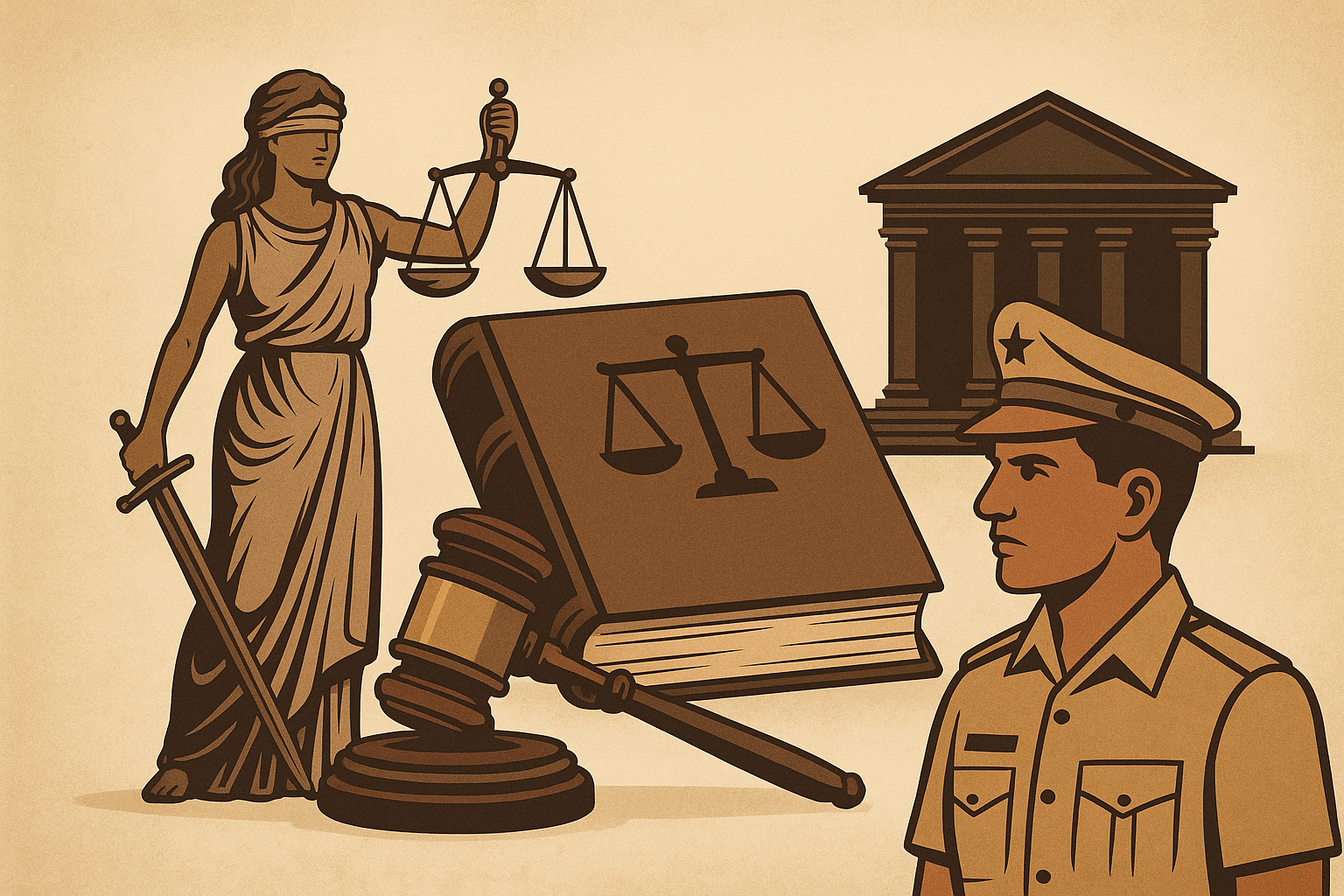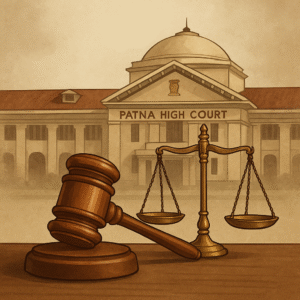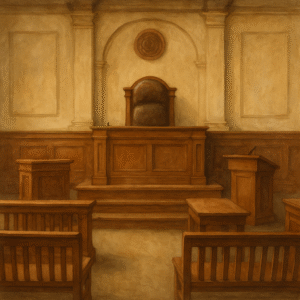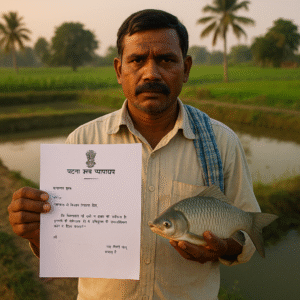Simplified Explanation of the Judgment
The Patna High Court, in Civil Writ Jurisdiction Case No. 7803 of 2020, delivered a significant ruling concerning the dismissal of a Bihar Military Police (BMP) constable accused of consuming alcohol and misbehaving with colleagues during duty. The Court, presided over by Hon’ble Mr. Justice Chakradhari Sharan Singh, set aside the dismissal order dated 31 May 2020, holding that the disciplinary authority acted arbitrarily by removing the petitioner from service without conducting a proper departmental inquiry.
The petitioner was a member of the Bihar Military Police, deputed at the Adarsh Police Station, Kishanganj. The incident occurred on the night of 26 May 2020, when, according to a report by the Superintendent of Police, Kishanganj, the petitioner was allegedly found intoxicated and creating a disturbance in the police barrack. A medical test purportedly showed alcohol consumption, and he allegedly misbehaved with officers who tried to calm him down.
Based on this report, the Commandant of BMP-12, Saharsa (the disciplinary authority) dismissed the petitioner from service by invoking Article 311(2)(b) of the Constitution, Rule 20 of the Bihar Government Servant (CCA) Rules, 2005, and Clause 10(ii) of Appendix 49 of the Bihar Police Manual, Volume 3. This provision allows dismissal without inquiry if holding such an inquiry is “not reasonably practicable.”
The Petitioner’s Argument
Through counsel, the petitioner contended that:
- He was not given reasonable time or opportunity to defend himself.
- The disciplinary authority invoked Article 311(2)(b) without any valid reason to dispense with the inquiry.
- His explanation—that he had taken homeopathic medicine after fasting for Eid and had not intentionally consumed alcohol—was not properly considered.
- The mere use of an alcometer showing 3.04% alcohol was not conclusive proof of intoxication.
- The order was arbitrary, premeditated, and unconstitutional since no circumstance existed making it impracticable to conduct an inquiry.
The petitioner relied on the Supreme Court’s landmark decision in Union of India v. Tulsiram Patel, (1985) 3 SCC 398, which established that disciplinary authorities can dispense with inquiry only after recording written reasons that such an inquiry is impracticable in the circumstances.
The State’s Defence
The State’s counsel argued that members of the Bihar Military Police must maintain exemplary conduct, particularly after the implementation of prohibition laws under the Bihar Prohibition and Excise Act, 2016. The petitioner’s behavior was seen as grave misconduct since consumption of liquor by a government servant is a punishable offence under Section 37(c) of the Act. The government’s circular (DGP’s memo dated 26 March 2019) had instructed strict disciplinary action, including dismissal, against police personnel found intoxicated.
Court’s Analysis
The Court observed that Article 311(2) is a constitutional guarantee ensuring fairness and adherence to natural justice before dismissing or removing a civil servant. However, this safeguard can be dispensed with only in exceptional cases listed under the second proviso to Article 311(2). Clause (b) of this proviso allows such action when the authority is satisfied—and records in writing—that it is not reasonably practicable to hold an inquiry.
To invoke Article 311(2)(b), four essential conditions must be fulfilled:
- The government servant’s conduct must warrant major punishment (dismissal, removal, or reduction in rank).
- The disciplinary authority must be satisfied that holding an inquiry is not reasonably practicable.
- The reasons for this satisfaction must be recorded in writing.
- Such satisfaction must come from the competent authority itself.
The Court emphasized that absence of any of these elements renders the order illegal and unconstitutional. Citing Tulsiram Patel (1985), Jaswant Singh v. State of Punjab (1991) 1 SCC 362, and Reena Rani v. State of Haryana (2012) 10 SCC 215, the Court reiterated that dispensing with an inquiry cannot be based on mere convenience, assumption, or departmental circulars.
In the present case, the Court found that the disciplinary authority had not recorded any written satisfaction explaining why an inquiry was impracticable. The alleged misconduct (alcohol consumption and misbehavior) could easily have been examined in a regular departmental proceeding based on witness testimony and evidence. There was no threat, violence, or situation that made it impossible to conduct an inquiry.
Therefore, the High Court held that the dismissal violated the constitutional mandate under Article 311(2) and was void, illegal, and ultra vires.
Significance or Implication of the Judgment
- Reinforces constitutional safeguards: The ruling reiterates that government servants cannot be dismissed arbitrarily. Disciplinary authorities must record written reasons before dispensing with a departmental inquiry.
- Limits misuse of Article 311(2)(b): The judgment prevents misuse of “summary dismissal” powers, ensuring that such exceptional provisions are applied only in truly impracticable situations.
- Strengthens employee rights: Even in disciplined forces like police, due process must be observed.
- Clarifies administrative law principles: Departmental circulars or general orders (like the DGP’s memo) cannot override constitutional mandates.
Legal Issue(s) Decided and the Court’s Decision
- Whether dismissal without inquiry under Article 311(2)(b) was valid:
– Decision: No. The disciplinary authority failed to record reasons why inquiry was impracticable. Hence, dismissal order invalid. - Whether departmental inquiry could have been held:
– Decision: Yes. There was no evidence of threat, disorder, or obstruction that made inquiry impracticable. - Whether circulars can justify dispensing with inquiry:
– Decision: No. Administrative orders cannot override constitutional safeguards under Article 311. - Relief Granted:
– The dismissal order dated 31.05.2020 was set aside.
– The petitioner was directed to be reinstated forthwith with full back wages and consequential benefits.
– The State, however, was given liberty to conduct a fresh disciplinary inquiry following due process.
Judgments Referred by Parties
- Union of India v. Tulsiram Patel, (1985) 3 SCC 398
- Jaswant Singh v. State of Punjab, (1991) 1 SCC 362
Judgments Relied Upon or Cited by Court
- Union of India v. Tulsiram Patel, (1985) 3 SCC 398
- Reena Rani v. State of Haryana, (2012) 10 SCC 215
- Risal Singh v. State of Haryana, (2014) 13 SCC 244
Case Title
Md. Muqaddar Khan v. The State of Bihar & Ors.
Case Number
Civil Writ Jurisdiction Case No. 7803 of 2020
Citation(s)
2021(2) PLJR 355
Coram and Names of Judges
Hon’ble Mr. Justice Chakradhari Sharan Singh
Names of Advocates and who they appeared for
- For the Petitioner: Mr. Ansul, Mr. Uma Shankar Sharma, Mr. Abhinav Ashok
- For the State (Respondents): Mr. Bishwa Bibhuti Kumar Singh, A.C. to A.G.
Link to Judgment
MTUjNzgwMyMyMDIwIzEjTg==-JouFOvznLxw=
If you found this explanation helpful and wish to stay informed about how legal developments may affect your rights in Bihar, you may consider following Samvida Law Associates for more updates.








